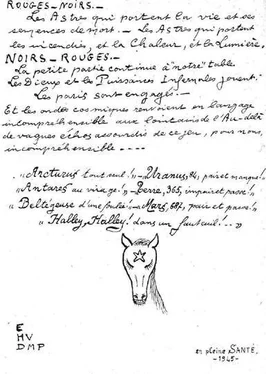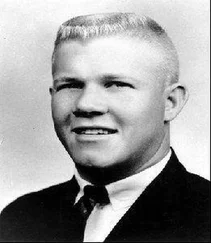The question became more charged when police found something else at rue Le Sueur: two specimens of human genitals preserved in jars of Formol.
AT some point that morning—the time is disputed—a black Citroën pulled up to 21 rue Le Sueur with four German officers, obviously of high rank. They entered the building and then quickly returned to the car. By the early afternoon, the time also unclear, a telegram from the High Command of the German Military Occupation reached Massu’s offices on the Quai des Orfèvres. It read in full: “Order from German Authorities. Arrest Petiot. Dangerous Madman.”
As Commissaire Massu prepared his arrest warrant, an officer telephoned police headquarters with something he’d uncovered in Petiot’s home region of Yonne. In 1926, just one year before he married Georgette, Petiot’s lover, Louisette Delaveau, had disappeared under mysterious circumstances.
Louisette Delaveau, or Louise as he called her, had worked as a housekeeper with one of Petiot’s patients. She and the doctor had met at a dinner in 1924, when Delaveau, then a twenty-four-year-old brunette with dark eyes, served the meal. Petiot was obviously attracted. His friend René Nézondet said that he had never seen him so carefree.
Petiot had used his contacts around town to find out more about this woman. He learned that she liked to shop on rue Carnot, attend mass at Notre Dame, and occasionally relax at Frascot’s bistro. The proprietor of that establishment, Léon Fiscot, or “Old Man Frascot,” also happened to be one of Petiot’s patients. Surprised and apparently enjoying the opportunity to play matchmaker, Frascot agreed to serve as a go-between. Petiot wrote her a letter and asked his friend to deliver it. Louise, if she was interested, should telephone him at his medical practice or show up at his house on rue Carnot.
When she called the next day, they arranged a meeting for the evening at Frascot’s bistro. The date went well, ending with a romantic walk back to Petiot’s house. They would continue to sneak away for arranged and impromptu dalliances, until not long afterward, Louisette moved in with the doctor. For the sake of appearances, she became his cook and maid.
The difficulties of living with Petiot—obsessive, compulsive, and already demonstrating a passion for purchasing “bargains” at auctions—soon took their toll. Other sources of tension surfaced, not least of which was that Petiot had begun an affair with another patient. Delaveau may have been pregnant, too, as she had confided to one of her friends, adding that Petiot would take care of it. The young physician was already suspected of supplementing his income with illegal abortions.
But in May 1926, Louisette Delaveau disappeared. To friends, Petiot explained her departure as the result of a quarrel so uproarious that she had stormed out of town without saying where she was headed. René Nézondet remembered how distraught his friend appeared after her disappearance. At one meeting over lunch not long afterward, Petiot had been weeping. He stared into the distance aimlessly. His hands trembled even more than usual.
Apparently Louisette had not said good-bye to her friends or anyone else in town, either. She left no forwarding address and did not pack her personal belongings. “If she returns to the house when I am not here,” Petiot told Suzanne, who replaced her as cook and maid, “her things are there and you should give her this envelope.” The new employee did not know what was in the envelope. Louisette never returned.
Few at the time suspected anything sinister. One anonymous letter to the police did accuse Petiot of murdering his lover, but investigators did not find any evidence of foul play. The official search was abandoned after a few months.
Not long after Louisette’s disappearance, it had been reported, Petiot was seen loading a large wicker basket into the trunk of his sports car. This testimony gained additional relevance a few days later, when the body of a young woman in her mid-twenties was retrieved from the same kind of basket outside Dijon. What’s more, Commissaire Massu was in a position to appreciate the importance of something that had escaped investigators at the time. The corpse in the basket had been decapitated, the body had been dismembered, and the inner organs and intestines had been cut out.
MASSU approached crime methodically and with as little emotion as possible, trying not to differentiate between major and minor crimes, or what he called interesting and uninteresting ones. In each case, it was only a matter of victims and criminals—the former had to be identified and the latter apprehended and brought to justice. No more, no less. “A murder is a murder,” he said.
Massu was a native Parisian, born on December 9, 1889. His father had died in Massu’s second year, and his mother had supported the family by working at a grocer’s shop. At the age of thirteen, Massu had gone to work for a butcher on rue des Capucines. He would spend the next five or six years working for various butchers around the capital. In January 1908, just after his eighteenth birthday, Massu volunteered for the army, joining the 117th Infantry Regiment. He was discharged two years later with the rank of sergeant and eventually found work again in the credit office of the large department store Galeries Lafayette, just a few steps from Dr. Petiot’s future home. Massu stayed there until his application to the police was accepted.
On December 16, 1911, at age twenty-two, Massu began work under Charles Vallet in the Brigade Mobile, which had been established to supervise the 1900 Paris Universal Exposition. His first days on the force coincided with the pursuit of the infamous band of anarchists known as the Bonnot Gang.
Viewing theft as liberation, Jules-Joseph Bonnot and his men had stolen automobiles and rapid-reloading rifles, which they then used to burglarize everything from shops to homes. On December 21, 1911, for instance, when they robbed a Montmartre branch of the Société Génerale Bank, they fled in an automobile; the police, at the time, pursued criminals on horseback and bicycle. The reign of the “Motor Car Bandits,” as the press dubbed them, ended with its leaders killed or captured, all during Massu’s first year on the force.
After years of chasing pickpockets, which he called “good training” for teaching him how to follow a suspect, watch that person closely, and ultimately catch him or her in the act of committing a crime, Massu had developed into a patient and observant detective with a mastery of police procedure. He was praised for his psychological insight into the criminal mind. As he gained more responsibilities, rising to secretary in August 1921 and eventually commissaire of police in January 1933, Massu would also earn a reputation for his ability to recognize the strengths and weaknesses of the men who served on his team. Some superb interrogators, Massu said, could not catch a pickpocket, and many detectives, veritable bloodhounds in the hunt for a criminal, would be lost in the interrogation room. His job was to delegate the tasks of an investigation accordingly.
Massu’s own specialty was interrogation. He placed an enormous value on its importance to an investigation. Evidence at a crime scene was often complicated, subject to a variety of interpretations; witnesses may lie, mislead, or make mistakes, and science, even in the best of circumstances, was not infallible. But an interrogation could produce a detailed confession—and this, when corroborated by outside verification, represented the most certain way to determine if someone was guilty and, what’s more, ensure that justice was in fact being served.
Success in the interrogation room meant tailoring his strategy to suit the suspect sitting in the green velvet chair in his office. Whether dealing with a thug or a sophisticated swindler, it was always essential to create a calm environment for questioning. A glass of beer or a dry white wine, the commissaire said, was more productive than screaming in the suspect’s face, threatening reprisals, or resorting to blows. Massu prided himself not only on gaining the most confessions at the Quai des Orfèvres, but, more important, on the fact that he had achieved these results “without raising the voice or the hand.”
Читать дальше












